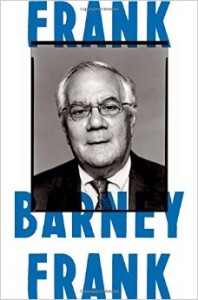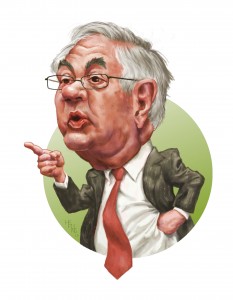 Frank: A Life in Politics from the
Frank: A Life in Politics from the
Great Society to Same-Sex Marriage
by Barney Frank
Farrar, Straus and Giroux
400 pages, $28.
GAY, JEWISH, and left-handed, Barney Frank likes to say that he’s a natural advocate for minorities. At the same time, had he not been gay, or so he insinuates here, he might have risen even higher in national politics as a voice of economic equality, universal health coverage, fair housing, and social reform. Born in New Jersey in 1940 to a middle-class family, his lifelong association with Massachusetts came by way of Harvard. After college, he began a doctoral program in government there, but left in 1968 to run the office of newly elected Boston mayor Kevin White. His “very short attention span,” which disposed him poorly for a life of scholarship, proved advantageous in the hurly-burly of political life. He returned to Harvard in the mid-’70s to take a law degree.
Stonewall was rippling in the background at this time. Deeply closeted, Frank met activists in Boston, including Rep. Elaine Noble, the first openly gay person to be elected to a state legislature in the U.S. (Ironically, after redistricting, Frank won Noble’s seat in the statehouse in 1974.) Still, he went out of his way to dispel suspicions of being gay. In a discussion pertaining to a liquor license for a Boston gay bar, he was asked under oath whether he was gay. He denied it, fearing that “taking the Fifth” would give him away. “Had my resistance to honesty been based wholly on fear of the electoral consequences, I would have had more courage,” he writes. “Most important, though, I simply was not ready to expose my previous masquerade and to share the deep secret I had kept for twenty years.”
He made up for this personal compromise by showing political courage in the Massachusetts House, where he sponsored pro-GLBT legislation at a time when some closeted Democrats opposed gay rights legislation to avoid being implicated. It was the 1980 election, when Reagan was first elected president, that brought Frank to the U.S. Congress in Washington. Still closeted to the public, he was now open in the capital’s GLBT circles. He explored Washington’s gay social scene and embarked on his first relationship. Leaders of the gay and lesbian movement considered him their undercover ally in government.
This equilibrium was threatened in 1986 by a book identifying Frank as gay. The book didn’t get much attention, and the mainstream press—then as now—studiously avoided outing public figures against their will. But increasingly Frank was sharing with his colleagues his intention to come out. His fellow Democrats were supportive if apprehensive: good for him, but why should he needlessly compromise his political standing? “I’m sorry to hear it,” Speaker Tip O’Neill told him. “I thought you might become the first Jewish speaker.”
In 1987 he finally gave The Boston Globe the go-ahead to broach the question in an interview. His fears proved unfounded. Many politicians, including two Republican senators, praised his courage, while others were indifferent. Michael Dukakis, the Democratic governor of Massachusetts, annoyed Frank by keeping silent. (Not wasting time on his enemies, Frank takes offense mainly from his allies.) A poll showed his popularity in his district actually inched up a bit. “Until then,” he writes, “I hadn’t realized the full effect on my personality of living in the closet. Simply put, I was now nicer.” This from a man known for his impatience, even rudeness, in his dealings with staff and colleagues. And the payoff was also personal: he entered into an eleven-year relationship with Herb Moses. He is now married to Jim Ready, whom he met at a political event.
In 1989 Frank was implicated in a scandal involving Steven Gobie, a prostitute who was reportedly entertaining clients in Frank’s Washington apartment. Frank was afraid this would end his career, but a heartfelt speech on the House floor helped him get by with a Congressional reprimand. This is also the narrative’s lowest point. If this could have been an opportunity for Frank to disclose what really happened, we are instead reminded of the quick-thinking politician who says he takes full responsibility but doesn’t say for what.
Once he did come out, around midway through the book, he was able to turn his sights more single-mindedly to legislative matters. Looking back on some high points, he offers an insider’s take on the 1993 enactment of “Don’t ask, don’t tell,” the passage of the Defense of Marriage Act (DOMA) in 1996, and the Clinton impeachment. As chairman of the Congress Finance Services Committee, Frank helped save the U.S. banking system during the financial crisis of 2008-09, and the monumental Dodd-Frank Act of 2010 bears his name.
What comes through unmistakably is Frank’s political pragmatism, formed as a reaction to the leftist utopians he first encountered at Harvard. He now criticizes GLBT leaders’ penchant for taking a short-term outlook. As for his personal life, it remains for the most part private. A dance with a boyfriend in a White House reception is a public statement, not a moment of intimacy. While Frank says that no one is too busy or virtuous not to enjoy a private life, we must conclude that the world of politics is essentially where he has lived his life.
Yoav Sivan is an Israeli journalist and a regular GLR contributor.






